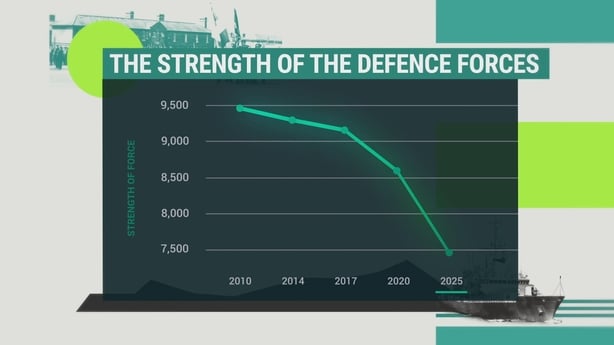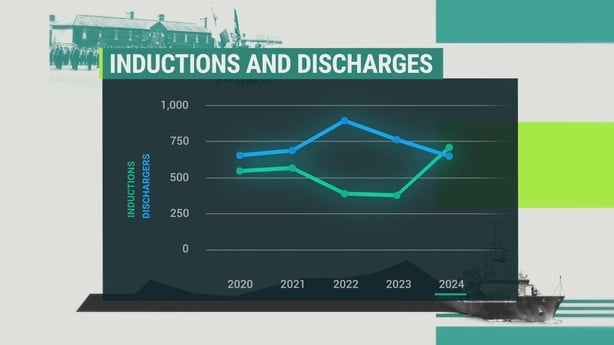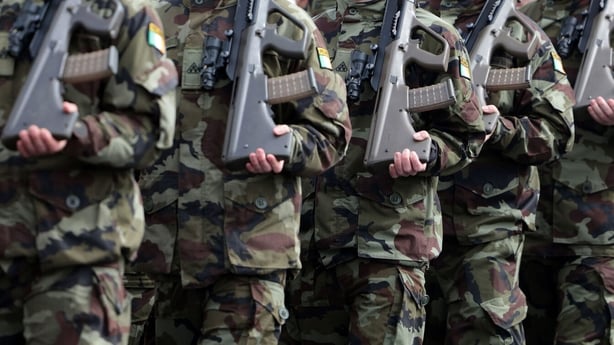The Defence Forces has said attracting and retaining members remains difficult as it seeks to boost numbers.
"We do have some challenges in recruitment at the moment. We're operating in a very competitive employment market and there is almost full employment in the country," Lieutenant Colonel Maeve O'Grady said.
Figures released to RTÉ News show that the strength of the Defence Forces fell by around 2,000 over the last 15 years.
The strength of the Defence Forces include members of the army, air corps and the naval service.

In 2024 there were 7,557 personnel compared with 9,480 in 2010. Numbers within the Defence Forces fell nearly every year between 2010 and 2024.
The force also decreased further at the beginning of 2025, with 7,497 members at the end of January.
In 2023, just 415 people joined the force; however, that jumped to 708 in 2024 - the first year the strength of the force grew in seven years when discharges were taken into consideration.

Deputy Secretary General of the Representative Association of Commissioned Officers Derek Priestley welcomed the increase in numbers last year.
"I think we're up to a net 34, so that's very welcome. But we would have certain concerns around the idea that a lot of those numbers are still in training and how many of them will transition to be fully qualified officers or soldiers. Time will tell," he said.
Security and defence analyst Declan Power said the slight increase is a reflection that "attention" has been given to the "needs of the Defence Forces".
"There has been improvement in payment in particular for the junior and listed ranks. There has been an improvement in conditions of service. I think there is still more work to be done in those areas but I think it's starting to go in the right direction," he said.
Lt Col O'Grady said that there is no "silver bullet" when it comes to retaining staff as the statistics show nearly 900 people left the Defence Forces in 2022 but just 435 joined. The number of discharges continued to be high last year with 674 leaving the force.
"People leave for all sorts of reasons, it may be pension or pay. Some people are going to the private sector. So we don't believe that we have to match private sector wages exactly because we have such a strong offering besides wages," she added.
"We have a very competitive package. We recruited over 700 people last year. We intend to recruit over 800 again this year.
"In terms of salaries our general service recruits are on approximately €42,000 when they complete basic training. Our newly commissioned officers are on between €45,000 and €49,000. On top of that, there are overseas allowances and technical pay rates available to people," she said.
She also pointed out members having access to secondary private health care, accommodation during training and receiving an education up to Masters level.
"We do feel like we have turned a corner with recruitment and retention. Our numbers grew for the first time last year. It's certainly a big challenge for us but we're committed to working very hard to get to the goal of 11,500 by 2028," Lt Col O'Grady said.

Mr Priestley said that addressing the long and uncertain hours is important when recruiting and retaining staff.
"Only recently, in 2024, we agreed with the Department of Defence where elements of the Working Time Directive will be introduced and provide protections so excessive hours isn't the norm," he said.
"When excessive hours or long hours are done, there are mitigating conditions applied where people can be assured of time off. So work-life balance for everybody is very important. The part introduction of the directive will certainly ease those measures," he added.
A Defence Forces cadet competition for new recruits opened last Friday.
Mr Power said that the retention issue has to be addressed and suggested reviving the Reserve Defence Forces.
"The third level community in Ireland all have significant numbers of people who might not want to spend an entire career in the Defence Forces but who would certainly join a Reserve component and maybe serve four or five years particularly in the area where they have expertise. That allows the Defence forces to expand much quicker in a time of extremist," he said.







